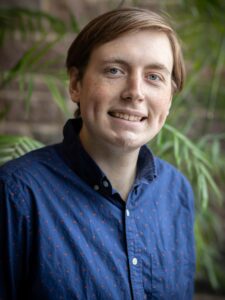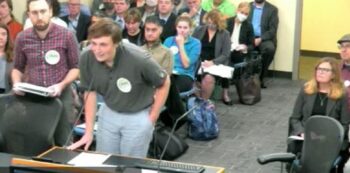 By Jack Hurbanis
By Jack Hurbanis
Being present in rooms with the people who have power and make decisions in our communities is one of the foundational pieces of community organizing. Whether those are elected officials, business and nonprofit executives, or religious leaders, showing up is key to ensure their decision-making power is used in the interest of the community they represent.
As an organizer, I constantly think about what meetings I want people to be aware of and where there might be a lack of public space – meaning that I may need to help to create that space.

Jack Hurbanis testifying on behalf of the synod’s EcoFaith Network at the October Public Utility Commission meeting
Our Minneapolis Area Synod EcoFaith Network’s work around energy utilities has led us to advocate on behalf of inclusive financing programs. (If you hadn’t heard about this work before, check out this one-minute explainer video.) Such policies make it easier for all people to reduce the amount of energy they use and pay for. And working for this policy solution has been all about showing up in public spaces – many where people perk their ears up when they hear there are people from the local Lutheran church wanting to talk about why their faith has called them to care about energy policy.
“The PUC commissioners decided to reject the program and take no action on helping Minnesotans reduce their energy use and help move us forward into a more sustainable future.”
On October 13, a dozen EcoFaith leaders joined other concerned community members at a Minnesota Public Utilities Commission (PUC) hearing. At this public meeting, the PUC would decide whether or not CenterPoint Energy would adopt an inclusive financing program for its Minnesota customers. This was the culmination of a nearly year-long process of gathering community and expert opinion on the idea of inclusive financing, spurred on because a number of communities in Minneapolis demanded such a program.
Ecofaith Network members were a part of the more than 70 individuals who submitted written testimony to the PUC, telling their personal stories and explaining their support of the program. The Ecofaith Network also supported local energy organizations in submitting more than 30 pages of technical and expert commentary on the program.
THE HEARING LASTED just over two hours, most of which consisted of PUC commissioners asking questions of different groups and deliberating; but it did allow for public statements from those who had participated in the written commentary process. I, along with Tim Schaefer from Comunidades Organizando el Poder y la Acción Latina (COPAL), spoke on behalf of a coalition of 19 energy justice, faith-based, local self-determination, and clean energy organizations.
The PUC commissioners decided to reject the program and take no action on helping Minnesotans reduce their energy use and help move us forward into a more sustainable future.
While the decision was incredibly disappointing, I don’t share this experience here to make you feel despair. Instead, I share this to shine a light on why it is so important that faith communities – like the ones we are a part of – be in rooms like the October 13 PUC hearing, even when we disagree about the decisions being made.
“We are present in board rooms to show the power of community, to demand a future where everyone of our neighbors is cared for, and to let our decisionmakers know that we aren’t going away until that future exists.”
Because we are there to show the power of community, to demand a future where everyone of our neighbors is cared for, and to let our decisionmakers know that we aren’t going away until that future exists. This rejection only strengthened our Ecofaith leaders’ commitment to increasing access to energy efficiency.
If you are looking for help in knowing where you might make the most impact in being present, don’t hesitate to reach out! You can find me at j.hurbanis@mpls-synod.org, even if your passions don’t lie in attending Minnesota Public Utilities Commission meetings with our Ecofaith Network, I bet I can help connect you with someone who can help you get you involved in any issue area.
